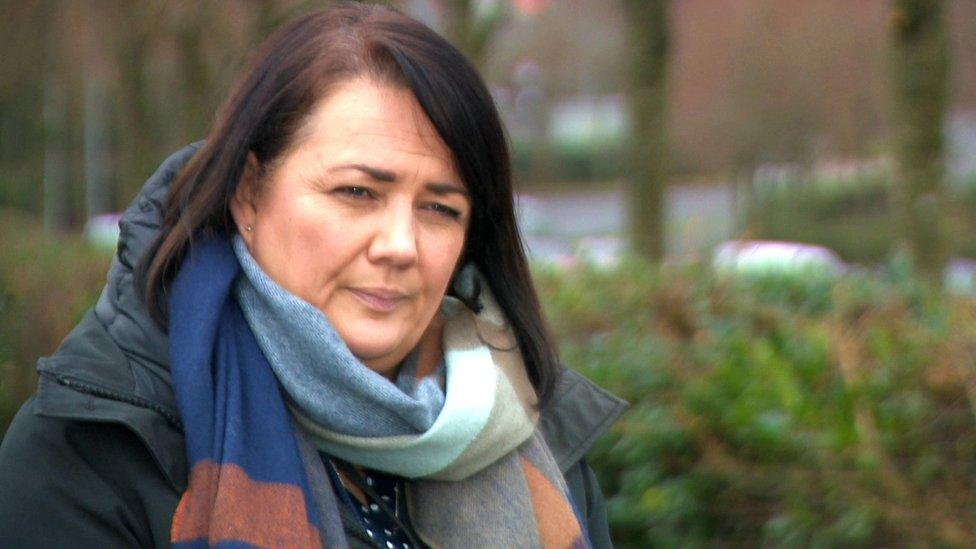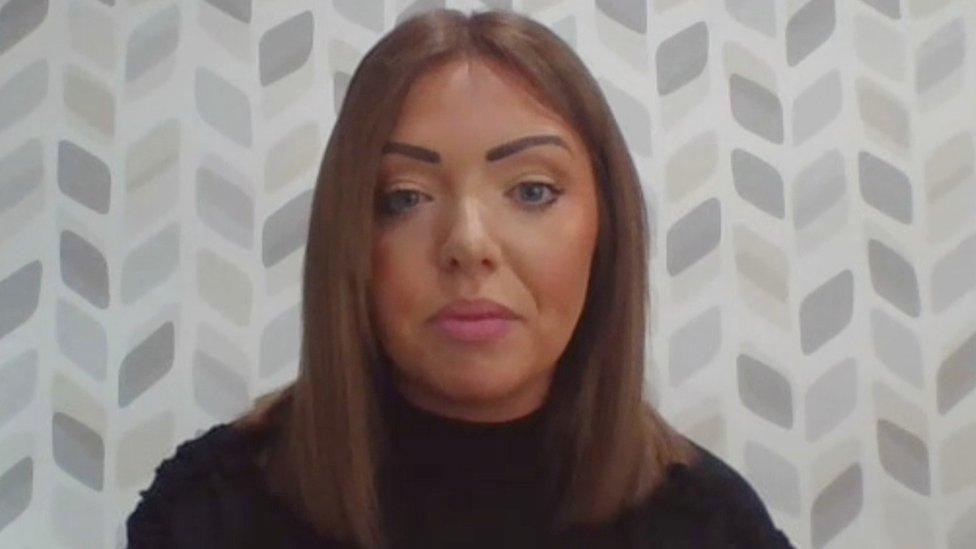Who will look after my children if he murders me?
- Published
How Emma escaped a violent relationship
It wasn't until Emma's partner held a knife to her throat that she escaped a violent relationship, four years after the abuse started.
She is telling her story to encourage others who have experienced domestic abuse to seek help.
Emma, 31, believes the key for those in abusive relationships is to get out quickly.
She said it took her four years to be able to leave, but with hindsight there had been signs of abusive behaviour early on.
Emma was at a vulnerable point when she met the man who would go on to abuse her.
"Very quickly we were together, moved in, and were expecting our first baby together," she told BBC Scotland.
"The first time he physically assaulted me, [our first] child was 12 weeks old.
"I confronted him about something that we had been arguing about, that quickly changed from screaming and shouting to being strangled on my living room floor, in front of our daughter."
Afterwards, she left with her children - but came back.
"And I came back every time for the next four years," she said.
'Cut contact'
Emma was worried that if she left, the courts would allow him to see their children unsupervised. So she stayed in the belief it allowed her to protect them.
But then one night, he held a knife to her throat. "It hit me like a ton of bricks… there's a huge possibility that he's the person that will murder me - and then who will look after my children?"
This thought was enough to make her call the police, who arrested her partner. He served a prison sentence.
"The only advice I can give someone in my situation is to cut contact," she said.
"As soon as they have a channel of communication, they have skills to put the blame on you.
"If you deny them that communication, the fog and the confusion will quickly lift and you're more likely to stay away and be liberated."

Det Ch Supt Sam Faulds said it could be difficult for victims to recognise their situation
Police Scotland is also urging people to come forward if they suspect abuse.
Det Ch Supt Sam Faulds said: "Abuse can be gradual and it can be very difficult for victims of domestic abuse to recognise their situation and to then take action to get themselves out of it."
The force launched a domestic abuse disclosure scheme six years ago.
Since then more than 13,000 requests for information have been made, with more than 7,000 people being told of a partner's violent or abusive past.
Det Ch Supt Faulds said the disclosure scheme had helped in some cases to prevent domestic abuse.
She said those told about a partner's past have the right to choose the course of action they wish to take, and that families and friends could also ask for a disclosure to be made.
And she added: "Behind the numbers are people who have either escaped becoming victims of domestic abuse, or who are now aware of their partner's abusive past."

Claire learned about her partner's violent past through the scheme - and believes it may have saved her life.
Now aged 35, she was in an abusive relationship for 18 months. At first her abuser put her on a pedestal, but he became violent to the point where she ended up in hospital.
She said: "The abuse went from one punch to consistently every other week - whether that be my mobile phone being thrown across the Asda car park or an iPad smashed off the wall."
Claire's parents were so worried about her that they went to the police, and a disclosure check discovered that her partner was high risk.
Claire said her heart sank when she was told about the risk - but stayed with her partner because she wanted to "fix things and make it work".
But that changed three months later when he "flipped" after she discovered him messaging someone else.
"Within seconds I was being battered in my own home," she recalled.
"This night was so different to any other. He was a monster; his eyes were black, and nothing was stopping him no matter how much I begged him."
Early intervention
Claire asked him to go and he left the flat, only to come back minutes later.
"He kicked the door in, threw me to the ground then he came back and stamped on my head," she said.
As a result of the attack, Claire had to get three new front teeth.
Her neighbours took her in and phoned the police. This time Claire was ready to talk about what was happening to her, and her partner was later jailed for four years.
She said that the early intervention by the police, and then their quick response, had probably saved her life.
"I would tell anyone if they are unsure or have an inkling that their partner might have an abusive past then to check and listen to what the police say," she added.
"Ask for help, it's out there - and there is always a way out."
If you're affected by any of the issues in this article you can find details of organisations who can help via the BBC Action Line here.
If you feel you are in immediate danger, call the police on 999.